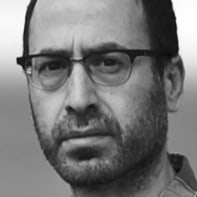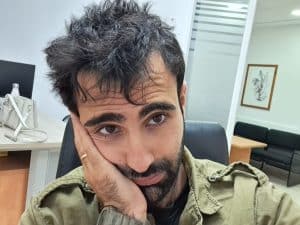Recently, more than a n y t h i n g else, I would like to have my Judaism removed. This personal request engenders mostly questions. The answers are in no rush to arrive.
Why is this happening to me? I feel no denial or distaste toward Judaism. I also have no interest in any other religion or ethnicity. I am not an atheist. I grew up in a traditional Jewish household in which my parents carried on the Jewish legacy of their grandfathers and grandmothers. Even now, the existence of God is present in my thoughts in very private and substantive ways. So the what is going on with Judaism?
To try and understand my desire, I go a little ways into my past and remember how in my first years I believed that I the person and the Jewish religion nestled within me were one and the same, in other words joined in some integrated and organic manner. However, already in my teens, the split between the pair began and two entities were formed. One – my self that included body and soul, and the other – my Judaism or the Jew within me. These two identities became separate and over time, this sensation became insight and a permanent feature in my way of life.
However, in order to understand the more urgent matter, I must ask “Who is the Jew?” who seeks to renounce himself. I try again and again to get to the bottom of the “Jewish character that nestles inside me”, I do not understand its appearance. How does it operate within me, toward me and toward others? Why does the race I belong to (and am associated with) continue to be so significant, even if I haven’t always dealt with the questions of its substance and individuality? Is it possible that being Jewish imbues me with a unique consciousness? Are my everyday experiences and sensations colored differently than those of someone who is not Jewish?
This is not the place to launch an investigation into these questions, and maybe such an investigation isn’t even important at this stage. What is important to understand is that the sound of these questions places me on an uneven platform. I must state that I am unstable and my days are disturbed and this is because of the Jewish component that I carry within me. I wouldn’t want to analyze the question “What is a Jew?” or “Who is a Jew?” because I have no interest in being comprehensive and providing conclusions.
I have always evaded unequivocal definitions of identity, group or status. My efforts to characterize them have failed. This is also true when I approach the question of the “Jewish” entity in me. However, something else happens when I ask my own self about this. Every time I raise “Jewish” I in my thoughts, I feel myself tense ahead of his arrival. The independent and permanent presence of the Jew in me never allows me direct access to him and I can never hold a direct dialogue with him. When I see the Jew in my mind’s eye, he is rather tall, wrapped in dark clothing, his face is unclear and his eyes look at me like a prison warden, the glance telling the story of our common prison. At the sight of this vision, I immediately feel indifferent about his Jew, although I feel he is far stronger than I.
What happens to a person who feels there is something inside himself that rises against him, supervises him and he himself – in other words that thing, the supervisor – realizes that this isn’t good? This appears to be a collision between the two. The Jew and I chafe unavoidably. For the sake of comparison, this doesn’t happen to me when I think of the Zionist in me or the Israeli in me. These two do cause conflicts and dilemmas in my mind, but this is not the same as the internal, existential abuse meted out by the Jew in me. Not at all. And I do not think this is because Judaism is a thousands-ofyears-old religion compared to the far-younger Zionist movement.
There is no need to go so far. The seeds of the definition of the strong Jew can be found in the past twenty or thirty years. The State of Israel gives him – the Jew – tremendous strength and power. But even if that happens, and there may be something to that affecting the Jew inside me, I can still say that I manage to curb that the establishment glorification of Judaism (the establishment of both the spirit and the real). In other words, even if Jewish education tries to force on me the importance of race and its preservation, in part through indoctrination, I myself reject it. And yes, I have the power to do that.
But look! The Jew in me is still here and stable. He never rests and is always on guard. In this way I may be giving him extraordinary attributes whose secrets have not yet been unraveled
Sammy Bardugo is an author









